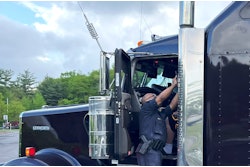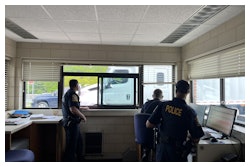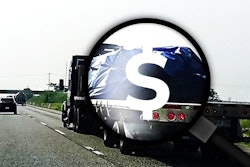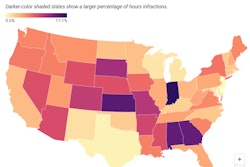Trucking news and briefs for Tuesday, May 20, 2025:
OOIDA makes known its opposition to Trump’s ‘big, beautiful bill’
The Owner-Operator Independent Drivers Association on Monday published a letter it sent to Congressional leaders expressing association opposition to the U.S. House’s budget reconciliation package, known as the One Big Beautiful Bill Act.
The bill passed from the House Budget Committee on Sunday night with a nail-biter 17-16 vote. The House Committee on Rules is scheduled to meet to discuss the bill at 1 a.m. Eastern time Wednesday.
In its letter to House Speaker Mike Johnson (R-Louisiana) and House Minority Leader Hakeem Jeffries (D-New York), OOIDA said the package as currently written “surprisingly looks far from beautiful. Not only has the House failed to include trucker’s top priorities, some of which we have been imploring legislators to remedy since 2017, but you have astonishingly included new taxes on our members. Regrettably, we are forced to oppose the legislation in its current form.”
[Related: Trump II and the outlook for speed limiters, broker transparency, parking push]
First, the organization addresses the bill’s $5 million allocation for the Federal Motor Carrier Safety Administration to develop a public website that provides information on motor carriers that specifies whether or not a motor carrier meets FMCSA operating requirements. The provision would also require an annual $100 fee for each person seeking access to the website.

OOIDA noted that the U.S. DOT already publicly posts that information and raised concern over the potential that small-business truckers would have to pay the $100 fee to access the information. “Our members already pay numerous federal taxes and fees, and as part of this reconciliation process, we believe Congress should be eliminating unnecessary taxes, not creating new ones,” OOIDA said.
The new website, as previously reported, appeared intended to be a place for brokers, freight forwarders and other entities to verify operating authority and thus be considered to have "taken reasonable and prudent determinations in engaging such motor carrier.” In addition to viewing the $100 fees as a new tax, OOIDA noted the move seemed designed to do little more than "help freight brokers limit their legal liability."
[Related: Transportation budge moves in House might help small fleet in 'Conditional' rating limbo]
The group also expressed opposition to a provision of the budget package that makes certain TCJA provisions permanent, specifically the elimination of the per diem deduction for employee drivers.
“We heard from members who received an unexpected tax hike after TCJA was enacted -- for as much as thousands of dollars more than they had anticipated,” OOIDA said. “As part of reconciliation, Congress should be restoring employee drivers’ ability to deduct daily meal expenses while on the road, not permanently increasing their tax burden.”
Finally, OOIDA expressed its disappointment that the House reconciliation package does not include a provision to repeal trucking’s Fair Labor Standards Act overtime pay exemption. The bill proposes to exempt overtime wages from taxes, but OOIDA said failing to remove the motor carrier overtime exemption for truck drivers means that, “even if a motor carrier currently pays their drivers overtime (despite not being required), these overtime wages would still be taxed if the reconciliation package were enacted,” the group said. “This means truckers will be denied a new tax benefit guaranteed to virtually every other every blue-collar worker in America.”
If the bill passes the House Rules Committee and the full House, it will then move to the Senate for consideration.
[Related: Ways to handle per-diem and depreciation deductions and cut against common tax myths]
Aurora puts driver back in seat of autonomous/'driverless' trucks
According to a blog from autonomous truck developer Aurora’s CEO Chris Urmson, the company has added an operator back into its trucks operating an autonomous lane between Dallas and Houston.
The company announced driver-out operations on May 1, but Urmson said one of its OEM partners, Paccar, “requested we have a person in the driver’s seat, because of certain prototype parts in their base vehicle platform.”
Urmson said Aurora is “confident this is not required to operate the truck safely based on the exhaustive testing,” but decided to respect the request of their long-time truck manufacturer partner.
Aurora said it will be “moving the observer, who had been riding in the back of some of our trips, from the back seat to the front seat.”
That observer, however, will still not operate the truck, as “the Aurora Driver will continue to be fully responsible for all driving tasks, including pulling over to a safe location if required,” the company said.
The news comes just a week after reporting on the Texas legislature revealed lawmakers there floating a possible ban of fully driverless trucks on Texas roads.
Aurora touted its autonomous driving system for safely operating for more than 6,000 miles along the route between Dallas and Houston, adding that the decision to put an observer back in the driver’s seat “has no impact on our near-, mid- and long-term development plans. Our partnerships are critical to our long-term strategy. We’re confident in the technology, grateful for our partners, and excited about the driverless road we’re on.”
[Related: Aurora says it's hauling driverless for Uber Freight, Hirschbach between Dallas and Houston]
FMCSA renews Drug and Alcohol Clearinghouse waiver for motion picture haulers
DISA Entertainment Compliance Solutions (DECS), formerly known as Motion Picture Compliance Solutions, remains exempt from certain Drug and Alcohol Clearinghouse requirements following the renewal of a waiver by the Federal Motor Carrier Safety Administration.
The waiver allows DECS members that employ CDL holders to conduct a limited query of the Clearinghouse before hiring a driver for a project rather than a full query. If the limited query indicates that information about the driver exists in the Clearinghouse, the driver is not permitted to perform safety-sensitive functions unless and until a full query subsequently shows that the driver is not prohibited from operating a commercial motor vehicle.
Federal regulations do not allow employers to hire a driver without first conducting a pre-employment full query of the Clearinghouse. A full query allows the employer to see any information that exists about a driver in the Clearinghouse. An employer must obtain the driver’s specific consent, provided electronically through the Clearinghouse, prior to the release of detailed information in response to the full query.
A limited query, however, allows an employer to determine whether the Clearinghouse contains any information about the driver but does not release any specific information about the driver. Limited queries require only a driver’s general consent, which is obtained and retained outside the Clearinghouse and may be in written or electronic form. Limited queries can be conducted to satisfy the annual query requirement.
DECS has held the exemption since 2020. With the renewal, the waiver is effective through May 28, 2030.
[Related: Motion picture haulers seek renewal of waiver from Clearinghouse regs]










